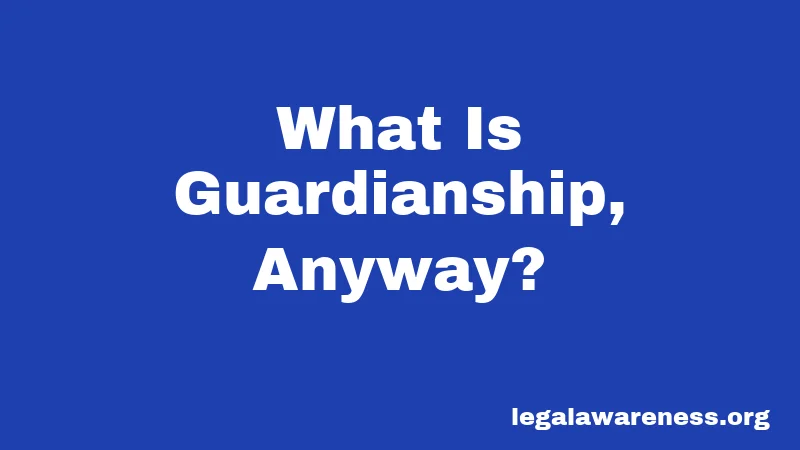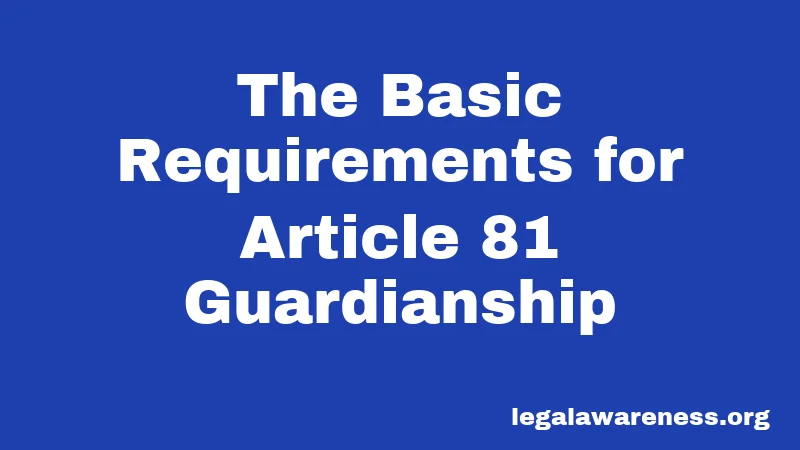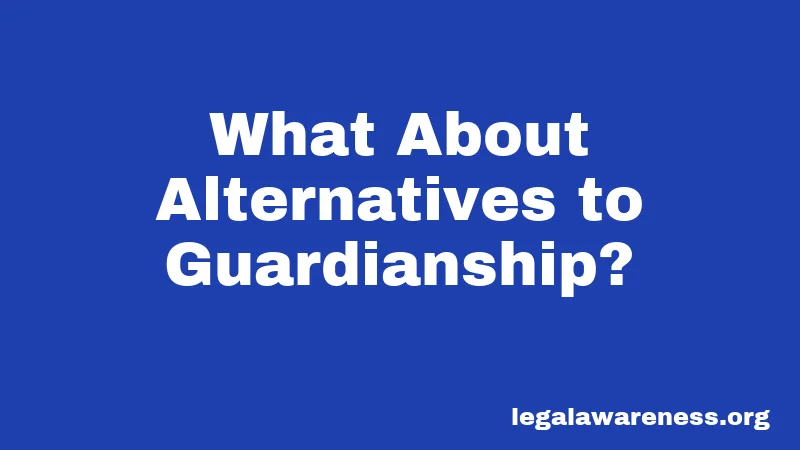New York Guardianship Laws in 2026: Everything You Need to Protect Your Loved Ones
Most people don’t think about guardianship until they suddenly need it. Honestly, that’s pretty normal. But here’s the thing: New York has specific laws that protect vulnerable adults, and understanding them could save your family from major headaches down the road.
If you’re caring for an aging parent, a disabled family member, or a child who lost their parents, guardianship laws directly affect you. Let’s walk through exactly what you need to know.
What Is Guardianship, Anyway?

Think of guardianship as a legal way to help someone who can’t take care of themselves anymore. A court gives a guardian—that’s you or someone you nominate—the power to make important decisions for that person.
Guardianship kicks in when someone truly can’t manage their own affairs. Sound complicated? It’s actually more straightforward than you’d think, once you break it down.
A guardian might handle money management, healthcare decisions, living arrangements, or all three. But here’s what’s important: the guardian only gets the powers they actually need. New York doesn’t hand over total control. Instead, courts tailor the guardianship to the person’s specific situation.
Three Types of Guardianship in New York
Okay, pause. Read this carefully. New York has three different types of guardianship, and which one applies depends on the person’s age and situation.
Article 81 Guardianship: For Adults
This is the most common type. Article 81 guardianships are for adults (18 and older) who can’t manage their personal or financial affairs because of illness, dementia, injury, or disability.
You’re probably thinking: “When would I actually need this?” Here’s a real example. An 82-year-old with Alzheimer’s can no longer pay bills, recognize when her medications are running out, or understand that she’s at risk. Her adult daughter petitions for Article 81 guardianship to handle finances and medical decisions. That’s exactly what Article 81 covers.
The cool part? The court only gives the daughter the powers she actually needs. Maybe the mom can still decide where to eat lunch. Maybe she can’t decide where to live. The guardianship reflects her real abilities.
Article 17 Guardianship: For Minors (Under 18)
This applies to children whose parents can’t care for them anymore. Maybe the parents passed away. Maybe they’re incapacitated. Whatever the reason, a guardianship ensures the child has someone responsible making decisions.
This type of guardianship typically goes through Surrogate’s Court in the county where the child lives.
Article 17-A Guardianship: For Adults With Intellectual or Developmental Disabilities
This is specifically for adults who have intellectual disabilities or developmental disabilities. It’s different from Article 81 because it’s usually broader—the guardian gets more authority overall.
These cases also go through Surrogate’s Court.
The Basic Requirements for Article 81 Guardianship

Let’s get into the legal stuff, but keep it simple.
For a court to appoint an Article 81 guardian, the judge must find two things. First, the person must be unable to manage some or all of their personal needs or financial affairs. Second, the person must be at risk of harm because they don’t understand or appreciate that they need help.
That’s the legal test. But what does it actually mean?
It means the court looks at your loved one’s real-world abilities. Can they understand what their bills are? Do they recognize they need medication? Can they understand the consequences of their decisions?
Not sure what counts as “at risk of harm”? Let me break it down. Risks include things like financial exploitation, unsafe living conditions, medical neglect, or inability to care for basic needs like food and hygiene.
The Guardianship Process: Step by Step
Here’s where things get serious. Once you decide guardianship is necessary, you’re heading to court. Stay with me here—I’ll walk you through it.
Step 1: File the Petition
You start by filing a “Verified Petition” with the Supreme Court or County Court in the county where your loved one lives. This petition explains their situation, your relationship to them, and why you believe they need a guardian.
The petition includes details about their income, assets, family members, and the specific reasons guardianship is necessary. Think of it as telling the court your story.
Step 2: The Court Evaluator Gets Involved
After you file, the judge appoints a Court Evaluator. This person is basically the court’s detective. They investigate everything in your petition. They’ll meet with you, your loved one, and other people who know the situation.
The evaluator writes a report recommending whether guardianship is appropriate and who should be the guardian. Pretty important role, right?
Step 3: Notice Is Served
Your loved one—the alleged incapacitated person, or “AIP”—has to be personally served with notice of the guardianship case. The notice has to be in bold, at least 12-point type, and explain their rights. This includes the right to fight the guardianship, get a lawyer, and request a jury trial.
This part matters because courts take due process seriously. Your loved one gets a real chance to contest the guardianship.
Step 4: The Hearing
This is the main event. You and your loved one appear in court (if they’re able). You present evidence—usually medical records, testimony from doctors, and evidence of their functional limitations.
The judge listens to everything. Your loved one can argue against the guardianship if they want to, or their attorney can do it for them.
Honest truth? The timing has changed recently. The law used to require hearings within 28 days. As of 2025, that expanded to 35 days. Why? The system got overwhelmed with guardianship cases, and judges needed more time.
Step 5: The Judge Decides
The judge decides whether your loved one is truly incapacitated. The standard is “clear and convincing evidence”—a pretty high bar. The judge can’t just take your word for it.
If the judge agrees, they appoint you as guardian. But here’s the important part: the judge specifies exactly what powers you get. You might have power over money management but not healthcare decisions. Or vice versa. Or both. It depends on the person’s needs.
Step 6: Training and Appointment
If you’re appointed guardian, you’ll need to complete a training program. The court requires this before officially appointing you. Once you complete training and get approved, you receive “Letters of Guardianship”—basically your legal permission slip to act on their behalf.
What About Alternatives to Guardianship?

Here’s something courts really want you to know: guardianship is a last resort.
Before a judge will appoint a guardian, they have to consider whether something less restrictive could work instead. This matters because guardianship seriously limits a person’s rights and independence.
Some alternatives include:
Power of Attorney — Your loved one signs a document giving you authority to handle money and property. This only works if they can understand what they’re signing and agree to it.
Healthcare Proxy — Similar to power of attorney, but for medical decisions only.
Supported Decision-Making — New York added this option in 2022. Instead of a guardian making decisions for someone, a “supporter” helps the person make their own decisions. It’s less restrictive than guardianship.
Representative Payee — If your loved one receives Social Security, a representative payee can manage those benefits without needing full guardianship.
Trusts — Sometimes a properly set-up trust can handle financial matters without guardianship.
Wondering if this applies to you? Ask yourself: can your loved one still understand and appreciate their situation? Can they sign documents? Can they make some decisions independently?
If the answer is yes, you might not need guardianship. Courts really appreciate when families explore these options first.
What Powers Can a Guardian Have?
A guardian’s powers fall into two categories: personal needs and property management. The court decides which powers you actually need.
Personal Needs Powers
This means you make decisions about where your loved one lives, what medical care they receive, and how their daily life operates. Examples include deciding where they live (home, assisted living, nursing home), consenting to medical treatment, and arranging support services.
Here’s what a guardian cannot do: You can’t force your loved one into involuntary mental health treatment. You can’t force psychiatric medications they don’t want. You can’t admit them to a psychiatric facility against their will. If that’s needed, there’s a separate legal process called Assisted Outpatient Treatment (AOT).
Property Management Powers
This means handling money and assets. You might pay bills, collect income, manage bank accounts, sell property, or enter into contracts.
Again, the court only gives you the powers actually needed.
Recent Changes to New York Guardianship Law
New York has been looking at guardianship reform. Pay attention to these changes.
Kinship Guardianship Expansion (2025)
In 2025, New York expanded who can become a kinship guardian. Historically, only people who had relationships with a child before foster care placement could qualify for kinship guardianship assistance (KinGAP). The new law changed that.
Now, foster parents who developed strong bonds with children while caring for them can also access KinGAP support. This helps about 500 youth every year who age out of foster care without family connections.
The change basically says: if you’ve been caring for a foster child and have a real relationship with them, your role is valued, even if the relationship started in foster care.
Karilyn’s Law (Proposed)
This is important if you have a loved one already under guardianship. Karilyn’s Law (named after a guardianship abuse victim) would require that guardians can’t arbitrarily deny visitation with family and friends.
The law is based on real cases where guardians isolated vulnerable people from their families. If passed in 2026, it would allow family members to petition the court for visitation rights if they’ve been wrongfully denied access.
Extended Hearing Timeframes
The hearing timeframe extension we mentioned? That’s real. Judges said the system was overloaded. Extending from 28 to 35 days gives courts breathing room.
Who Can Be a Guardian?
Not just anyone can become a guardian. You have to meet some basic requirements.
You must be at least 18 years old. That’s pretty much the only age requirement. You can be a family member, a friend, or even a non-profit organization.
The court looks at your character, fitness, and ability to serve. They’ll investigate whether you have criminal convictions or child protective services history. They want to make sure you’re trustworthy.
Here’s the key: if no family member or friend is willing and able, the court can appoint a professional guardian. These are trained individuals or organizations who handle guardianships as their job.
Family members usually get preference if they’re qualified and willing. But the court’s main goal is finding the person best suited to protect your loved one’s interests.
Costs and Financial Considerations
You’re probably wondering: how much does guardianship cost?
The answer depends on your situation. Filing fees, court evaluator fees, attorney fees, and process server fees all add up. In some cases, fees can run several thousand dollars.
But here’s the silver lining: the court can authorize fees to be paid from your loved one’s assets, if they have any. So you might not be paying out of pocket.
Some counties have public guardian services for people who can’t afford private representation. If money is tight, ask the court about these options.
Ongoing Responsibilities as a Guardian
This isn’t a one-time court appearance. Once you’re appointed, you have ongoing responsibilities.
You’re required to act in your loved one’s best interest. You have to keep careful records of financial transactions. You file annual reports with the court showing how you’ve spent money, what medical decisions you’ve made, and how your loved one is doing.
The court stays involved to make sure the guardianship is working as intended. You can’t just disappear after the appointment.
Some guardians find this reassuring—the court is watching to make sure nobody abuses the system. Others find it burdensome. Either way, it’s the law.
Terminating a Guardianship
Guardianship isn’t always permanent. If a loved one improves or no longer needs a guardian, the guardianship can end.
Either the ward (your loved one) or the guardian can petition the court to terminate the guardianship. You explain why it’s no longer needed.
The judge reviews the petition and decides. If the judge agrees, the guardianship ends, and the person regains their rights and independence.
This is important: guardianship lasts only as long as necessary. Courts don’t want people under guardianship longer than needed.
Special Circumstances and Exceptions
Standby Guardianship
This is temporary guardianship for specific situations. You might use it if you’re expecting to be detained, if you’re facing immigration proceedings that might separate you from your child, or if you have a serious medical condition.
With standby guardianship, you name someone to take care of your child temporarily while you deal with your situation. It’s less permanent than regular guardianship.
Guardianship for Children Who Are Already in Foster Care
If your child is in foster care and you want to become the legal guardian to prevent termination of parental rights, there’s a kinship guardianship process. This is faster and involves less adversarial court proceedings than regular guardianship.
Kinship guardianship requires a pre-existing relationship with the child and certain training, but the benefits are significant. You can provide stability without fully terminating parental rights.
How to Report Guardianship Abuse
Trust me, this matters. High-profile cases show that guardianship abuse happens. If you suspect someone is abusing their guardianship power, you have options.
Contact your county’s Adult Protective Services. Call the New York State Attorney General’s office. If you believe crimes are happening, call law enforcement.
There’s also Karilyn’s Law advocacy (mentioned earlier) pushing for visitation rights reforms. If you know someone isolated under guardianship, these advocates want to hear about it.
Frequently Asked Questions
How long does an Article 81 guardianship take? The process typically takes several months. After you file the petition, there’s an evaluation period, notice is served, and then the hearing happens. The hearing is now scheduled within 35 days of filing. But the full process from start to finish usually takes 3-6 months.
Can my loved one contest the guardianship? Absolutely. They have the right to hire a lawyer, present evidence, and contest the petition. The judge must hear their objections. It’s not automatic.
Do I need a lawyer to file for guardianship? You don’t technically need one, but it’s strongly recommended. Guardianship cases are complex. A lawyer helps ensure your petition is properly prepared and presented. If you can’t afford one, ask about legal aid or court-appointed attorney options.
What’s the difference between guardianship and power of attorney? Power of attorney is a document your loved one signs, giving you authority. Guardianship is court-appointed when your loved one can’t sign documents or agree to a power of attorney. Guardianship is more restrictive but also more protective.
Can I be paid as a guardian? In some cases, yes. The court can approve reasonable compensation for a guardian’s services. This varies by county and situation. You’d petition the court for approval.
What happens if a guardian dies or can’t serve anymore? The guardianship doesn’t automatically end. The court appoints a successor guardian. Family members usually petition the court to nominate the new guardian.
Final Thoughts
Guardianship laws exist to protect vulnerable people. They’re serious matters that deserve careful consideration.
If you’re thinking about guardianship, start by exploring less restrictive alternatives. If guardianship truly is necessary, understand the process and your ongoing responsibilities.
New York’s courts take guardianship seriously and want to ensure they’re used only when necessary. That’s actually a good thing—it means your loved one’s rights are protected.
Talk to a lawyer if you can. Guardianship cases are worth professional help. And remember: you’re not alone in this. Courts handle these cases regularly, and resources exist to help you navigate it.
Stay informed, ask questions, and when in doubt, look it up or talk to an attorney. Your loved one’s welfare depends on getting it right.
References
- New York State Unified Court System – Guardianship Information: https://www.nycourts.gov/guardianship/index.shtml
- New York Mental Hygiene Law Article 81: https://www.nysenate.gov/legislation/laws/MHY/TEA81
- New York Courts – Guardianship of Incapacitated Adults: https://www.nycourts.gov/CourtHelp/Guardianship/AIP.shtml
- Decision Alternatives With(out) Guardianship NY – Article 81 Guide: https://dawgny.commons.gc.cuny.edu/guardianship/
- NY Senate Bill S8204 (2025) – Kinship Guardianship Expansion: https://www.nysenate.gov/legislation/bills/2025/S8204
- Supported Decision-Making in New York: https://sdmny.org/
- Legal Assistance of Western New York – Guardianship Information: https://www.lawny.org/node/391/what-guardianship
- New York State Attorney General – Adult Protective Services: https://www.ny.gov/new-york-state-attorney-general
